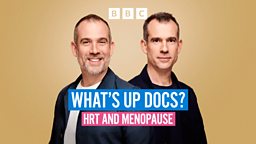Do you need treatment for your menopause symptoms?
Are you considering going on Hormone Replacement Therapy (HRT) to treat your symptoms of menopause, but are overwhelmed by the amount of information out there?
It’s not surprising, because with increased advertising and more celebrity endorsements than ever before, we have all become more aware of HRT, but does that necessarily make it the best thing for you?
In their Radio 4 podcast, What’s Up Docs?, Chris and Xand van Tulleken cut through the confusion and ask whether HRT can benefit everyone undergoing the menopause.
Listen: Menopause - is HRT for you?

Menopause is a natural part of ageing, occurring between about the age of 45 and 55 for most women. The body produces less of the hormones oestrogen and progesterone, a woman’s periods stop and she can no longer reproduce.
There are many well-established symptoms associated with menopause including hot flushes, night sweats, mood changes, loss of libido and difficulty sleeping. There can also be a greater risk of bone fractures and heart disease. “These can be really troublesome for some women, although not all suffer,” says Prof Mary Ann Lumsden, consultant gynaecologist at the University of Glasgow.
“So, for a majority of women, hormone replacement therapy is very successful, but it’s not suitable for all,” says Mary Ann. “There is no blanket recommendation about HRT. It’s not one size fits all.”
While HRT is one option, there are other things women can do to lessen the effects of the menopause.
Here are five ways to identify and treat the symptoms of the menopause:
1. Identify whether your symptoms are hormone-related
If you seem to have mood changes or what some people call brain fog, these can be the symptoms of menopause but they might not necessarily be hormonally associated. They could be the result of normal life pressures, anxiety and even depression. Talk to a doctor to try and identify the cause.
2. Adapt your lifestyle
A common symptom in menopause, known as hot flushes or flashes, is when the body is taken over with an intense feeling of heat in the face, neck and chest. There are triggers which can exacerbate this so consider reducing your intake of spicy foods, coffee and red wine. Being overweight increases the likelihood of hot flushes so it’s helpful to try and maintain a healthy weight to reduce this symptom.

3. Consider testosterone treatment
During a woman’s reproductive years, her ovaries produce some testosterone which is a hormone linked to libido, but as she goes through menopause this level drops and with it, her libido may also decrease. In clinical trials, testosterone replacement therapy (TRT) has been shown to improve libido. If you are considering TRT, keep in mind that most GPs are unlikely to offer it as there is no female preparation licensed in the UK. It can be bought privately, or some people choose to take a male treatment at a lower dose.
4. Weigh the benefits AND the risks
HRT is known to have significant benefits for most women. It can mitigate hot flushes, night sweats, joint aches and pains, some kinds of headaches and mood changes. There are some significant benefits to long term health too. It can help with bone density, reducing the risk of fractures. And started at the time of menopause, HRT can help the heart and blood vessels, thereby reducing the risk of heart disease.
While HRT is associated with a slightly increased risk of cancer, the current thinking is more nuanced than it used to be since some newer types of HRT may pose less risk in regard to cancers such as breast cancer. Guidelines by The National Institute for Excellence (NICE) say that there is a small increase in the risk of breast cancer which increases with the duration the drug is taken for, but that the absolute risk across the various forms of HRT is numerically small and lower than some lifestyle risks.
There are instances where HRT is not advised. If you’ve had hormone-dependent cancer, particularly breast cancer or a family history of cancer, your GP will probably advise you against HRT and the same is the case if you have had blood clots. However it is always worth discussing options with a medical expert.
5. Timing is everything
Hormones can have some short-term side effects, such as nausea, indigestion and leg cramps, so if you are trying HRT, it’s worth persisting for two or three months until the side-effects subside.
When you stop taking HRT, there will be some recurrence of symptoms, but these will probably be milder so it’s worth thinking about how long you want to stay on HRT and when you are ready to feel some symptoms again. There is no time limit for how long a person should be on HRT or when they should come off it. This is a personal choice.









